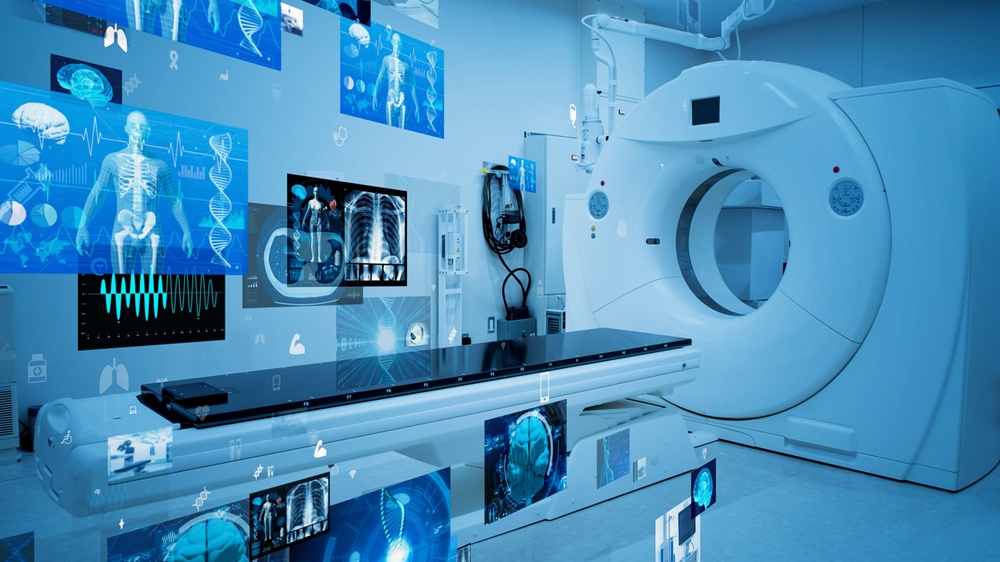Key Insights:
- AI boosts cancer detection in GPs, increasing rates from 58.7% to 66.0%, enhancing early diagnosis and treatment.
- “C the Signs” analyzes patient records, recommending tests, leading to faster and more accurate cancer detection.
- The AI tool, used in 1,400 GP practices, tracks patients and improves diagnosis rates, aiming for earlier cancer detection.
A new artificial intelligence (AI) program, “C the Signs,” has been introduced to assist General Practitioners (GPs) in England in detecting cancer more efficiently. This innovative tool, designed to analyze patients’ medical records, has led to a notable increase in cancer detection rates among GP practices utilizing the system. The tool was created by GP Bea Bakshi and her colleague, Miles Payling, with the aim of addressing delays in cancer diagnosis.
The “C the Signs” AI tool has proven to be beneficial in identifying cancer cases. Data indicates that the detection rate rose from 58.7% to 66.0% in GP practices that incorporated the system. This tool analyzes comprehensive patient information, including medical history, test results, prescriptions, treatments, and personal risk factors such as age, family history, and postcode. By identifying patterns that suggest a higher risk of cancer, the AI tool recommends appropriate tests or clinical pathways for further investigation.
The program was initially tested in 35 practices in the east of England in May 2021, covering a population of 420,000 patients. The results, published in the Journal of Clinical Oncology, showed a significant improvement in cancer detection rates by March 2022, while practices not using the system maintained similar detection rates.
Enhancing GP Decision-Making
The AI tool prompts GPs to inquire about new symptoms and suggests further tests if it detects potential cancer risks. “It could be a scan, an ultrasound, or they could need to be seen by a specialist at a clinic,” explained Bakshi. The system also tracks patients to ensure that doctors follow up on test results and referrals, aiding in timely diagnoses.
Bakshi’s motivation to develop this tool stemmed from a personal encounter with a patient diagnosed with late-stage pancreatic cancer.
“Why are patients with cancer being diagnosed so late?” she questioned.
This experience drove her to create a tool that not only aims for earlier but also faster diagnoses.
Validation and Effectiveness of the AI Tool
In a previous study involving 118,677 patients, the tool’s effectiveness was assessed, revealing that out of 7,295 diagnosed cancer cases, 7,056 were successfully identified by the algorithm. Additionally, when the tool assessed a patient as unlikely to have cancer, only 2.8% of these patients were diagnosed with cancer within six months.
Peter Holloway, a GP and co-author of the study, highlighted the challenges GPs face in recognizing cancer symptoms.
“We know a lot of cancers present with vague symptoms and some are difficult to define and don’t necessarily correlate with our guidelines,” he noted.
Holloway shared an example of a patient with common symptoms like diarrhoea and lower abdominal pain. The AI tool recommended a faecal test, which led to the early diagnosis and successful treatment of colorectal cancer.
Broader Implications for Cancer Detection
The UK currently has three cancer screening programs for bowel, breast, and cervical cancers. However, there are around 200 different types of cancer, many of which are asymptomatic or present symptoms that can be confused with other conditions. Bakshi emphasized that “two-thirds of deaths are in the non-screenable cancers and the ones that we aren’t screening for.”
Holloway believes that decision support systems like “C the Signs” play a crucial role in enhancing cancer detection. He also stressed the importance of improving patient awareness of potential cancer symptoms and increasing access to diagnostic technologies like CT and MRI scanners.
Future Directions in Cancer Detection
The NHS England Long Term Plan for Cancer aims to diagnose 75% of cancers at stages one or two by 2028. Research is also underway to determine the effectiveness of the Galleri blood test, which seeks to detect DNA from over 50 types of tumors. The trial began in September 2021, with 140,000 people tested so far.
Prof Peter Johnson, National Clinical Director for Cancer at NHS England, noted the progress made despite increased demand and pressure on services.
“Record numbers of people are being checked and treated for cancer, and we are now diagnosing a higher proportion of cancers at an early stage,” he stated.
Johnson highlighted the role of advanced technology in reducing wait times and finding cancers earlier, including “teledermatology” for skin cancer diagnosis, community lung trucks, and home testing for bowel cancer.
